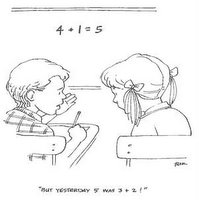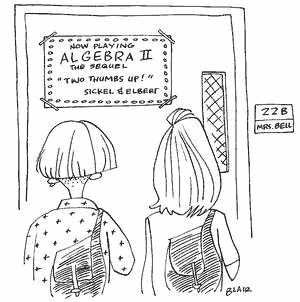 At university I didn't recognise until the end of my second year that as a mathematics student and a Christian I had to fight for the truth of Christianity in my study of mathematics. It wasn't English literature, wherein to fight the upholding of immorality as art, or post-modern literary theory. It wasn't Biological Sciences wherein to fight for the philosophical framework of intelligent design to be considered against the philosophical framework of the evolutionary model. It wasn't Psychology wherein to fight for a Christian approach to the mind. It wasn't Law wherein to fight for a Biblical basis for law and order in society. It was mathematics: the language of God's universe, beautiful in its own right, with no issues to raise or fight. Or so I thought. The battle I neglected was in my own thinking. I relegated my study of mathematics to a non-spiritual part of life, an inevitability. So while I started university delighting in studying mathematics to God's glory, I was really encouraged to be involved in CU. And when mathematics got even more difficult and circumstances piled against it, I retreated into involvement in CU. Of course I knew that it was all to glorify God. I knew that as a Christian I had a duty to try to work as if to the Lord - as I'd a duty not to cheat, or lie, or... But I didn't realise what that meant. I neglected that God had given me that original delight in mathematics to use to glorify him, so when everything stacked against it, I didn't fight to delight in mathematics for God's sake: I squandered it.
At university I didn't recognise until the end of my second year that as a mathematics student and a Christian I had to fight for the truth of Christianity in my study of mathematics. It wasn't English literature, wherein to fight the upholding of immorality as art, or post-modern literary theory. It wasn't Biological Sciences wherein to fight for the philosophical framework of intelligent design to be considered against the philosophical framework of the evolutionary model. It wasn't Psychology wherein to fight for a Christian approach to the mind. It wasn't Law wherein to fight for a Biblical basis for law and order in society. It was mathematics: the language of God's universe, beautiful in its own right, with no issues to raise or fight. Or so I thought. The battle I neglected was in my own thinking. I relegated my study of mathematics to a non-spiritual part of life, an inevitability. So while I started university delighting in studying mathematics to God's glory, I was really encouraged to be involved in CU. And when mathematics got even more difficult and circumstances piled against it, I retreated into involvement in CU. Of course I knew that it was all to glorify God. I knew that as a Christian I had a duty to try to work as if to the Lord - as I'd a duty not to cheat, or lie, or... But I didn't realise what that meant. I neglected that God had given me that original delight in mathematics to use to glorify him, so when everything stacked against it, I didn't fight to delight in mathematics for God's sake: I squandered it.  I would hope that I extrapolate too much from my experience. But I know so many others who segregated their studies from their Christianity - not always in terms of accepting non-Christian teaching, but in terms of neglecting to fight to glorify God in their studies. The students here in Belgium when given the chance to choose a subject for the monthly 'Focus' meetings, said, "We're University Bible Groups - but we only do the Bible Group part - we want to study The Christian and Work, or Study." Which bears witness to the lack of treatment - when pressed for examples they came up with ethics, coping with stress and failure, etc - for which they wanted Bible verses to reference. They know the need to work Christianly but they don't know the Christianity of work.
I would hope that I extrapolate too much from my experience. But I know so many others who segregated their studies from their Christianity - not always in terms of accepting non-Christian teaching, but in terms of neglecting to fight to glorify God in their studies. The students here in Belgium when given the chance to choose a subject for the monthly 'Focus' meetings, said, "We're University Bible Groups - but we only do the Bible Group part - we want to study The Christian and Work, or Study." Which bears witness to the lack of treatment - when pressed for examples they came up with ethics, coping with stress and failure, etc - for which they wanted Bible verses to reference. They know the need to work Christianly but they don't know the Christianity of work.We easily deny two-tier Christianity but hold on to it to some extent: work/study = Christian duty but church/CU = Christian delight. We delighted in work to God's glory in Eden and will again in the new heavens and new earth (Isa 65). We should delight in working to God's glory here too. The only difference is that the pervasive corruption of sin means we have to fight for joy in these things to God's glory. (Now if only I had realised that before the end of my second year.)
It occurs to me that CU (& church!) can easily contribute to the myth of 2-tier Christianity by giving enthusiastic young Christians non-study related work: evangelism and Bible study; which they readily think of as more worth-while, without a word being said on the subject. But that suggests the remedy: not to take away the evangelism and Bible study (God forbid!) but to say words on the subject! I'm very thankful that Mike Partridge organised a regional day on the subject for CU leaders at the end of my second year. So for the Belgian students who requested teaching on the subject (above) I've prepared a similar seminar looking at a Biblical framework (creation, fall, redemption, final restoration). My prayer is that they would see the totality of Christianity from the framework of the gospel, the falsity of two-tier thought, and pursue joy in God in all of life, including in their studies. That they wouldn't just cope (even Christianly) with study and vive le weekend! for church, or see their studies or work simply as a means to a more 'Christian' end such as witness or money for mission,
 but as a worthwhile God-glorifying thing in itself.
but as a worthwhile God-glorifying thing in itself.CU (/GBU) is an evangelism team on campus. Amen! But while we're about that let us encourage them to fight against the attitude which, however consciencious, hands study to the devil while they fight on 'more spiritual' fronts. Let's encourage Christian students to fight for joy in their studies, presenting them to Christ as Lord to his glory.



7 comments:
And the same thing is true about the 'secular work'/'christian work' dichotomy. Few enough preachers/writers tell you to enjoy your 'secular' job because you are glorifying God in it.
Not just glorifying God by witnessing to your colleagues, important though that is. But glorifying Him by doing the work that needs to be done, and rejoicing in using your gifts to do it.
Funny, I find that easy when I'm teaching. Housework is another matter :(
Of course, that's implicit in the theology and it's one of the application points in the seminar I'll do. More than blasting dichotomy it knocks down the whole hierarchical pyramid of jobs. Not that I can say it quite like that in French. Few Christians would be surprised that you could glorify God in teaching children, or CJ in doctoring, but in working as a civil servant or mending roads? Aha, the joy of housework. I can like it appreciating that I'm working towards it being done - sort of anticipatiory joy - but I'm not sure that's quite the same as glorifying God IN it.
Mending roads etc should be just the same as teaching and doctoring. And we *ought* to glorify God in housework. Like Sharon James (I think) says, our homes should show the world what God is like.
OH DEAR.
hmmm, I dunno...I think you're right in that as Christian's we often create a hierachy in our ATTITUDES...though I think in our actual proclamation we would all hold firmly to the truth that there are no hierachies...In actual fact, like everything we think/feel/do/say that we get wrong it's a misunderstanding and misapplication of grace in our lives!
wise words rosemary, thanks.
Great stuff, Rosemary.
it all comes down to worldview. if we do not have a gospel-centered worldview, we won't value maths, arts, or sciences as we ought. Great post.
Post a Comment